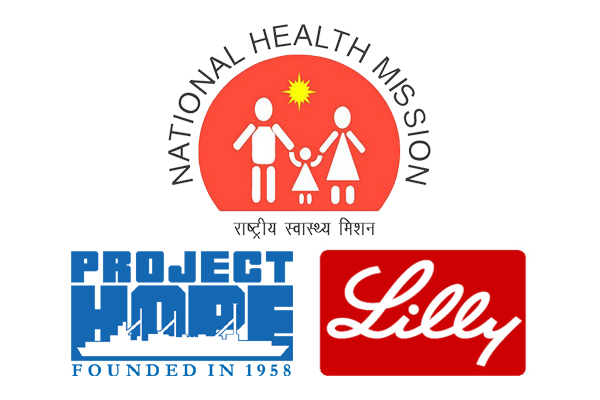Re-energising the NCD Community towards commitment and collaboration
After conducting two state level consultations with National Health Mission in 2017, Project HOPE and Eli Lilly and Company successfully conducted the 3rd and final consultation at national level. The aim of this consultation was to address implementation challenges in Non-Communicable Diseases (NCDs) and prioritize actions for effective implementation. These recommendations were compiled in a book of proceedings released at the end, comprising ideas and recommendations generated by the participants. In the series of consultations, the first 2 were held in Lucknow in October, 2017 and in Hyderabad in November, 2017 respectively; where all the NCD district implementers were invited to chalk out their recommendations to address implementation challenges.
NCDs account for 61% of deaths in India each year (Global Burden of Diseases Report, 2016). They constitute a major public health challenge, impacting both the social and economic development of the country with substantial human costs.
Speaking on the occasion, Dr Jitendra Singh, Minister of State in Prime Minister’s Office, Ministry of Personnel, Public Grievance and Pensions; Dept of Atomic Energy and Dept of Space who was the chief guest for the event said, “I would like to congratulate Project HOPE for having organised this event. The subject of non-communicable diseases marks the march of India from one era of disease spectrum to another era. Currently, NCDs in India are facing challenges in terms of economic, social, cultural & lifestyle aspects. Organisations like Project HOPE play a very important role to identify people who need help and educate them on social aspects. For economic and lifestyle aspects our present government is very sensitive and is going to launch Ayushman Bharat Yojana next month which will benefit 10 crore families with a insurance cover of Rs 5 Lakh each. The government has also started the process of wellness clinics all over the country and free dialysis unit in each of the hospitals especially at district level. I am glad Project HOPE provided me with this platform where I can brainstorm and stimulate on issues like these”.
Dr Laxmikant Palo, Regional Director- SE Asia/Country Director-India, Project HOPE said, “Addressing the programme implementation challenges of Non-communicable diseases (NCDs) requires comprehensive solutions developed together by all key stakeholders. Project HOPE is working in partnership with government and key stakeholders to respond to the growing burden of NCDs in India.”
The purpose of these consultations was to bring together representatives from government, national and international non-governmental organisations, civil societies, policy and programme implementers, and private sector, to exchange and share their experiences and ideas about addressing operational challenges in implementing NCD programmes.
Dr Thomas Kenyon – CEO Project HOPE global said, “Project HOPE welcomes the opportunity to support this national-level consultation on lessons learned and how to accelerate the Government of India’s exemplary efforts to control the growing burden of non-communicable diseases. These daunting challenges can only be overcome by mobilising the power of partnerships to deliver life-saving evidence-based interventions to those in need. This meeting further demonstrates our commitment and spirit of collaboration and coordination to save lives.”
Luca Visini, MD, Eli Lilly and Co India said, “India currently faces a huge burden of Non-Communicable Diseases. There is a clear need for simpler screening process and technology needs to be leveraged for training physicians and healthcare workers. We at Eli Lilly and Company are committed to the cause and glad to be a partner for this effort.”
The consultation called on the Central and State Governments, along with other partners, to take this agenda for NCD action forward.
- Advertisement -



Comments are closed.